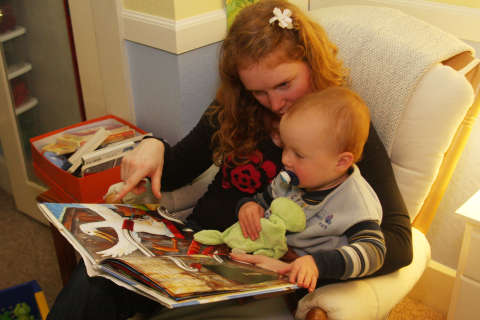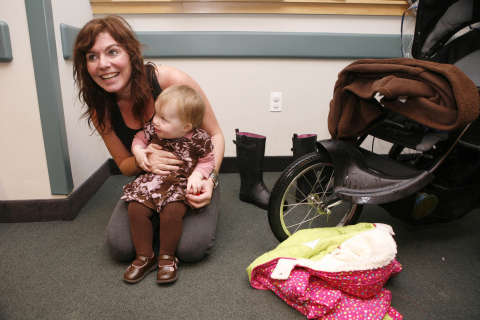WASHINGTON — It’s no secret that new babies need extra care and attention from their parents — from skin-to-skin bonding in the first few weeks, to snuggles and stories before bed.
But it turns out, that intense closeness is critical well past the first few months of a child’s life. Babies need it for the first three years — especially from their mothers.
Several years ago, psychoanalyst and parenting expert Erica Komisar started noticing a trend among American families.
“I was seeing an epidemic level of emotionally troubled children who were really suffering from the absence of their mothers on a daily basis,” said Komisar, citing an uptick in conditions such as ADHD, early childhood aggression and social disorders.
“And it’s just getting worse,” she said.
All the research pointed Komisar to one thing: the critical role mothers play in the first three years of a child’s development.
Why mothers? It’s science
A mother’s physical and emotional presence provides babies with two things: protection from stress and emotional regulation, both of which are important to healthy brain development and the child’s future well-being.
“The way that we become resilient to stress is that our mothers protect us from stress in the first three years, from moment-to-moment throughout the day,” said Komisar, author of “Being There: Why Prioritizing Motherhood in the First Three Years Matters.”
“If our mother isn’t there to protect us from that stress that we feel, then it doesn’t lay the foundation down to be resilient to stress in the future.”
And while care and concern from both mom and dad is important, from a biological perspective, it’s not interchangeable. Komisar says when mothers and fathers nurture a child, they both produce a hormone called oxytocin.
“This is what we call ‘the bonding hormone’ or ‘the love hormone,’” Komisar explained.
The oxytocin mothers produce during bonding makes them more sensitive and empathic nurturers. Whereas the oxytocin that fathers produce in the same circumstance makes them more playfully stimulating and “encouraging of children to be independent and explore.”
Komisar says both are needed in a child’s first three years, but children require much more of the sensitive and empathetic nurturing.
“So the more you’re with your baby, the more you’re present, physically and emotionally for your baby, the less stressed that baby is and the less stressed the mother is,” Komisar said.
What this means for women who work
For many women, bonding with our babies around the clock simply isn’t a possibility. According to the U.S. Department of Labor, women make up 47 percent of the American workforce. Many women return to that workforce before a child is even 3 months old.
Komisar is also a working mother, and understands the dilemmas and demands modern women face. She emphasizes that her book, “Being There,” is not about working vs. not working, since one can be physically present and emotionally checked out.
Rather, it’s about prioritizing children during the first three years. That is why she tells all mothers that “more is more.”
“The more time you’re with that baby, the better off that baby will be,” she said.
For working mothers, Komisar advises to take as much time off as possible after birth and to push the limits on what you can take.
“As women, advocate for yourselves and push the boundaries as much as possible even in the hours that you work,” Komisar said.
If possible, scale back from full-time to part-time. If that’s not an option, make the most of the time you spend with your baby at home by limiting distractions. Komisar says to leave your phone, tablet and computer by the door when you get home, and don’t pick them up until the baby goes to sleep.
When looking for a caregiver, forgo the high-achieving, “tough love” nannies and hire the caregiver who is the most loving toward your child.
“In modern day society, we tend to look for competence. We look for the baby sitters and nannies who can organize our closet, or cook, or food shop or clean efficiently. I say forget all of those things, because the most important thing is if that person is really emotionally and physically present for your baby,” Komisar said.
Another tip she offers working mothers is to keep things in perspective. It’s possible to make sacrifices in the workplace for a few years without derailing your entire career.
“If we’re all going to live as long as they say we’re going to live, then you have many, many years to be high-achieving in your profession — to make lots of money, to have great material success — but you really have a very short time to have this critical influence on your children’s emotional well-being.”
The need for change
Komisar says the obvious answer to help mothers be better able to care for their children during the most critical years is a change in policy.
“As a society, we really don’t respect mothering,” Komisar said, noting that the U.S. lacks a maternity leave policy.
“We have something called The Family Leave Act: This is not a maternity leave policy,” she added.
Komisar says while an 18-month leave, like the maternity policy available in Sweden, might not be attainable for the U.S., six months should be.
“We at least need to have six months of paid maternity leave, another six months of partial paid maternity leave, and another two years of flexible schedules for mothers,” Komisar said.







